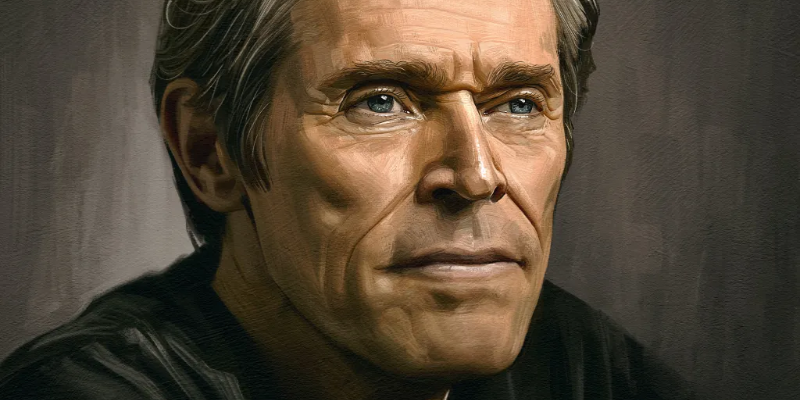Willem Dafoe on His Human Approach to Acting
This Week on the Talk Easy Podcast with Sam Fragoso
Illustration by Krishna Bala Shenoi.
Talk Easy with Sam Fragoso is a weekly series of intimate conversations with artists, authors, and politicians. It’s a podcast where people sound like people. New episodes air every Sunday, distributed by Pushkin Industries.
*
Willem Dafoe has built a career out of shapeshifting. His latest role in Yorgos Lanthimos’ Poor Things demonstrates exactly that.
Today, he joins us to discuss his compelling performance in the imaginative tale, the elaborate details he discovered on set, and the three-hour physical transformation he underwent each day of filming. Then, Dafoe describes his upbringing in Wisconsin, his early love of B-movie, and his formative years in the theater as part of The Wooster Group in New York City.
On the back-half, we dive into his task-based approach to acting and how it guided his memorable performances in the late William Friedkin’s To Live and Die in L.A., Oliver Stone’s Platoon, and Sean Baker’s The Florida Project. To close, Dafoe reflects on the joy of collaboration, his search for truth as an actor, and his desire to continue creating in years to come.
Subscribe and download the episode, wherever you get your podcasts!
From the episode:
Sam Fragoso: Before you jump into the movies, there was a way in which you developed your craft. There’s an essay in The Drama Review from 1985 called “Task and Vision,” where you lay out your principles and the work itself. “Task and vision, vision in the form of a task.” Can you explain to me what that means to you and how it is foundational to how you approach this work?
Willem Dafoe: That’s this idea that everything is based on doing, as opposed to showing. One of the beautiful things about The Wooster Group, which really put a heavy stamp on me, was that in that theater, the technicians were as important as the actors, and the actors were as important as the technicians. They weren’t all that different. It’s about having an experience, having something happen to you that’s transparent enough that the audience can hopefully have a flavor of that experience. It can broaden how we think, or it can give us other possibilities. Rather than telling us something we already know or recognize, put us in a new place. It’s why I like going to the movies so much— because you see some example of some personal generosity or heroism, and it inspires you. It’s about giving yourself to something that expresses a more collective experience. That’s the thing that gets me going: to lose yourself in something.
SF: Did you lose yourself on The Florida Project with Sean Baker?
WD: I try to lose myself as much as I can. With The Florida Project, I tried to be a good hotel manager.
SF: But the fluidity of that project—the collaborative ways in which everyone worked, the interplay between people—in some ways, the movie is about how happiness is interdependent on the people around you. And to me, that feels like somewhat of a metaphor for making movies, or trying to do the work that you’ve made.
WD: I’m with you.
SF: I was watching Poor Things and thought that the warmth of your role, the tenderness that’s at the heart of the film… I felt that deeply in The Florida Project as well. It reminded me of that film.
WD: Well, Bobby in The Florida Project is a person that takes care. That’s always moving to me. The thing that moves me more than anything else in a movie is when someone extends themselves in a way that has a flavor of selflessness to it. That they’re doing it because they need to do it. It’s a natural thing, it’s not transactional. If everything that is made is some sort of expression of what our experience is, being here and why we’re here, and it tries to address what we’re here for, the theory that I keep coming up with is we’re here for each other, because that’s what we got. What’s beyond this world, we don’t know. We won’t know until we get there. So, while we’re here, the best thing we can do is be useful.
__________________
Willem Dafoe is currently appearing in Poor Things. He is a founding member of The Wooster Group and one of the most immediately recognizable actors working today.
Sam Fragoso is the host of Talk Easy with Sam Fragoso, a weekly series of conversations with artists, activists, and politicians. His writing has appeared in The Atlantic, Vanity Fair, and NPR. After conducting seminal interviews with icons like Spike Lee, Werner Herzog, and Noam Chomsky, he independently founded Talk Easy in 2016.




















